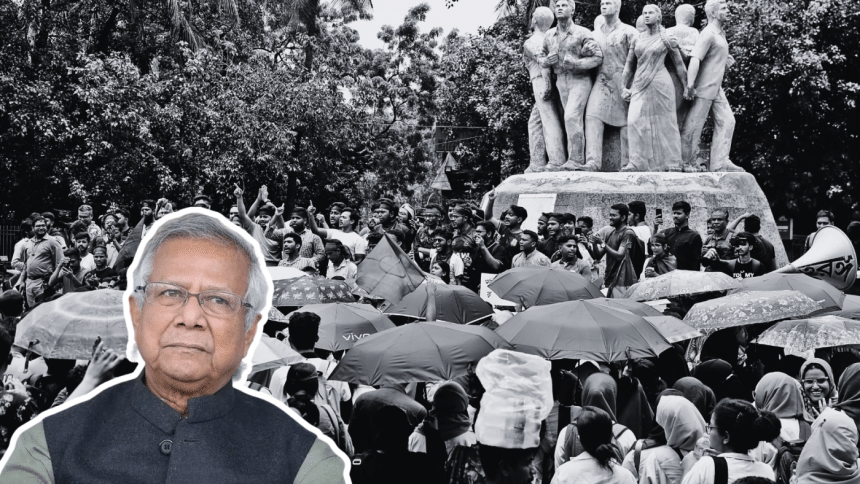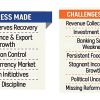Education left behind

One year into its tenure, the interim government is struggling to bring stability to the country's educational institutions, beset by campus unrest and disruptions to academic activities.
Many of the institutions have seen student protests, politically influenced appointments, forced resignations of teachers, and public humiliation of educators, underscoring the administration's lack of resolve to restore order in the education sector.
Upon assuming office, the interim government pledged to initiate sweeping reforms across key sectors through the formation of 11 reform commissions. However, education sector was left out.
Some educationists have described the past year as a lost opportunity, urging the administration to form a specialised, non-partisan commission to stabilise the sector and draft a long-term policy roadmap to guide the next government.
Following the fall of Awami League government, nearly all vice-chancellors of public universities resigned -- many under pressure from protesters due to their ties with AL. Their sudden departure disrupted academic and administrative activities at the universities.
It took more than a month for most universities to fully resume academic activities, with political influence continuing to shape university governance.
As appointments to the vacant posts were made, The Daily Star found that at least 30 of the 47 VCs appointed over the past year were affiliated with teachers' organisations linked to BNP and Jamaat-e-Islami.
Following the AL government's ouster, calls for a uniform policy for VC appointments gained momentum. Yet, the University Grants Commission has not introduced any such framework.
Disruptions to academic activities were not limited to universities only. Students staged protests at dozens of schools and colleges, demanding resignation of institutional heads.
According to a count by The Daily Star, at least 150 teachers across the country were forced to resign between August 5 and August 31 last year. Many were humiliated and harassed.
In some cases, teachers and officials were assaulted, with video clips of the incidents circulating on social media. The education ministry issued directives repeatedly to bring the situation under control but failed.
Throughout the year, both students and teachers staged demonstrations over their distinct demands -- from salary hikes and pay scale revisions to exam deferrals and auto-pass for students.
Many of these protests turned violent. The education ministry could neither maintain order nor negotiate meaningful resolutions.
Student groups on August 20 stormed the Secretariat and carried out vandalism, demanding cancellation of HSC and equivalent examinations postponed during the July mass uprising.
The authorities eventually scrapped the exams and published results through subject mapping, drawing criticism from academicians.
The then education adviser, Prof Wahiduddin Mahmud, later admitted that the decision was a mistake.
Another controversial move was the sudden reversion to the 2012 curriculum for class-6 to 12 amid pressure from a section of guardians and teachers. Students who had just begun adapting to the new curriculum were forced to shift back, resulting in widespread confusion.
The National Curriculum and Textbook Board (NCTB) was tasked with revising and reprinting 50 textbooks to align them with the previous curriculum. A coordination committee was formed to facilitate the process but was disbanded following backlash over its composition.
The NCTB promised to deliver the revised textbooks by December, 2024, but missed the deadline. New targets were set for January and February. However, nationwide distribution could not be completed until April this year.
School students in multiple districts began the academic year without full sets of textbooks, leading to significant learning loss, especially for those with limited access to digital tools.
In March this year, the government made a change in the top leadership of the sector, with Prof Chowdhury Rafiqul Abrar replacing Prof Wahiduddin as education adviser.
"A LOST OPPORTUNITY"
In October last year, the primary and mass education ministry formed a consultation committee to recommend ways to improve primary and non-formal education.
Headed by BRAC University Professor Emeritus Manzoor Ahmed, the committee submitted its report to Chief Adviser Prof Muhammad Yunus on February 10 this year.
On implementation of the committee's recommendations, Prof Manzoor said, "As of now, we've only seen piecemeal steps, not a comprehensive or systematic response."
Despite time constraints, the interim government could still establish a similar body for the education sector with a six-month tenure, he said.
"This could give the next government a strong foundation for much-needed reforms," he told The Daily Star recently.
Terming the past year a lost opportunity for the sector, he said, "The shortcomings inherited by the interim government were significant, but the response has been largely ad hoc. No substantive reform initiative has been taken. There has been no education commission, unlike in other sectors."
"It can be fairly described as a disappointing record," he said.
Criticising the government's approach as fragmented and uncoordinated, he said, "There was no holistic planning and no mechanism for short, medium, or long-term reform."
Prof Anu Mohammad, a former teacher at Jahangirnagar University, said it's true that everything cannot be changed in a year, but the government failed to do even what was possible.
"Why education was not given due importance under this government remains a pressing question."
Questioning why no education reform commission was formed, he said the government could at least introduce a uniform framework for teacher recruitment in universities.
Contacted, Education Adviser Prof CR Abrar said, "For those who expected a miracle within a year, their expectation is misplaced."
The education sector has been plagued with problems for years. "Can a government just assume power and change everything, especially in a situation where the youth who brought about this transition have a major stake in the outcome.".
"In such a context, decisions that affect them must be made with great care," he said.
About partisan appointments at universities, he said, "Perhaps it was the circumstances that led to the decisions made at a certain point of time… We have learnt from that process... It was not ideal.
"Not all the decisions were necessarily good. Perhaps the role of the state -- what it should have been and what was expected -- was not delivered."
On the formation of a commission for the education sector, the adviser said that commissions often operate on very short terms -- some for six months. Such short-term bodies, he argued, are not suitable for something as complex as education.
"We hope to see some meaningful and visible results within the next five to six months as we complete our tenure," he added.

 For all latest news, follow The Daily Star's Google News channel.
For all latest news, follow The Daily Star's Google News channel. 









Comments